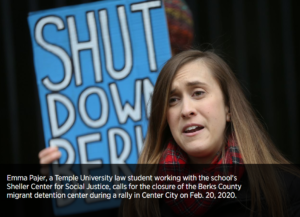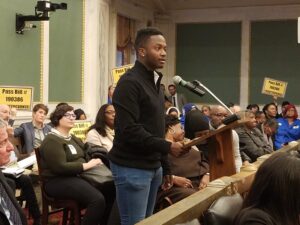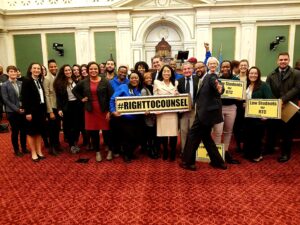By Elizabeth Castillo ‘22 & Emily Alvarez ‘21
The Trump administration has engaged in a policy of family separation, which it ramped up in 2018. Under that policy, families apprehended for crossing the border outside of a port of entry were forcibly separated. Parents were placed in adult detention while their children were sent to shelters for unaccompanied minors. They were frequently subjected to cruel conditions of confinement, including overcrowding and the inability to obtain adequate nutrition, hygiene, medical care or mental health services. Notably, the administration expressly announced its family separation policy as a tactic to deter Central American migrants from seeking safety in the United States.
In these facilities, parents and children endured weeks or even months without contact with one another. Parents and their children did not know when or if they would be reunited because immigration officials would not provide any information. The separation of parents from their children has predictably caused significant and long-lasting trauma to these families who had sought refuge in the United States.
Through the Sheller Center for Social Justice, we represented eight families in administrative claims against the Department of Homeland Security (“DHS”), Immigration and Customs Enforcement (“ICE”), Customs and Border Protection (“CBP”), and other government agencies responsible for this inhumane policy. These claims are brought under the Federal Torts Claims Act (“FTCA”), which allows individuals to hold the federal government accountable for personal injury. Filing these claims is a required step to preserve these families’ right to file a federal lawsuit to obtain relief for the unspeakable harm they suffered.
Our work began by interviewing each family. Question by question, we pieced together their experiences under the family separation policy. We then drafted detailed narratives for each family beginning with their entry into the United States until their reunification and release from detention. Details included detention center conditions, interactions with immigration officers, and most importantly, the emotional and physical impact on the families. This narrative became the central part of the administrative claim.
This effort to assist families in preserving their rights under the FTCA has allowed us to practice important lawyering skills. We talked through the relevant law and scope of representation with clients and answered their questions. We practiced the art of interviewing: how to build trust, sort through facts, and develop a cohesive narrative. As a group, we discussed at length and had the opportunity to engage in trauma-informed interviewing, a skill that few classes cover. We also researched the applicable tort law in the relevant jurisdictions in anticipation of filing federal litigation.
Beyond these skills, these families have taught us so much. Discussing immigration laws and policies and seeing their impact on the news does not prepare one to hear the stories first-hand. After speaking with these families, who have endured so much at the hands of our government, we have a deeper understanding of what a migrant experiences after he or she crosses into the United States. Their courage is remarkable and has inspired us as future lawyers. They fled to the United States to escape unimaginable abuse and even threats to their life and families. Even after that trauma, they incredibly still had the courage to share their experiences under the family separation policy. One client explained to us that she is motivated to share her experience, although it is very painful to recall, to raise awareness and prevent others from enduring it. In drafting these claims, we developed an appreciation of the meaningful role an attorney can play in people’s lives. We can help to provide a remedy, in the form of compensatory damages, and even support our clients in their healing processes.
The following students participated in this effort to obtain relief for families harmed by the government’s family separation policy: Erin Agnew, ‘21; Mana Aliabadi, ‘22; Emily Alvarez, ‘21; Elizabeth Castillo, ‘22; Stephanie Curl, ‘21; Dan Davis, ‘21; Laura DiGiulio, ‘21; Daniela Florido, ‘22; Theresa Glinski, ‘21; Sarah Hampton, ‘22; Lauren Leiggi, ‘21; Maya Lucyshyn, ‘22; Pretty Martinez, ‘20; Reena Naik, ‘21; Brittany Petrillo, ‘21; Natalia Ruggiero, ‘20; Kate Sears, ‘21; and Maria Thomson, ‘22. Professor Jaya Ramji-Nogales created the project with the support of the Asylum Seeker Advocacy Project (ASAP). Professors Jennifer Lee and Mary Levy also supervised student teams.

 Emma Pajer (’20), who helped to draft the lawsuit, spoke at a
Emma Pajer (’20), who helped to draft the lawsuit, spoke at a  Xavier and colleagues Julia Sheppard and Sarah Kim have spent the semester researching why so many landlord/tenant cases in Philadelphia result in default judgments — which then lead quickly to eviction.
Xavier and colleagues Julia Sheppard and Sarah Kim have spent the semester researching why so many landlord/tenant cases in Philadelphia result in default judgments — which then lead quickly to eviction.